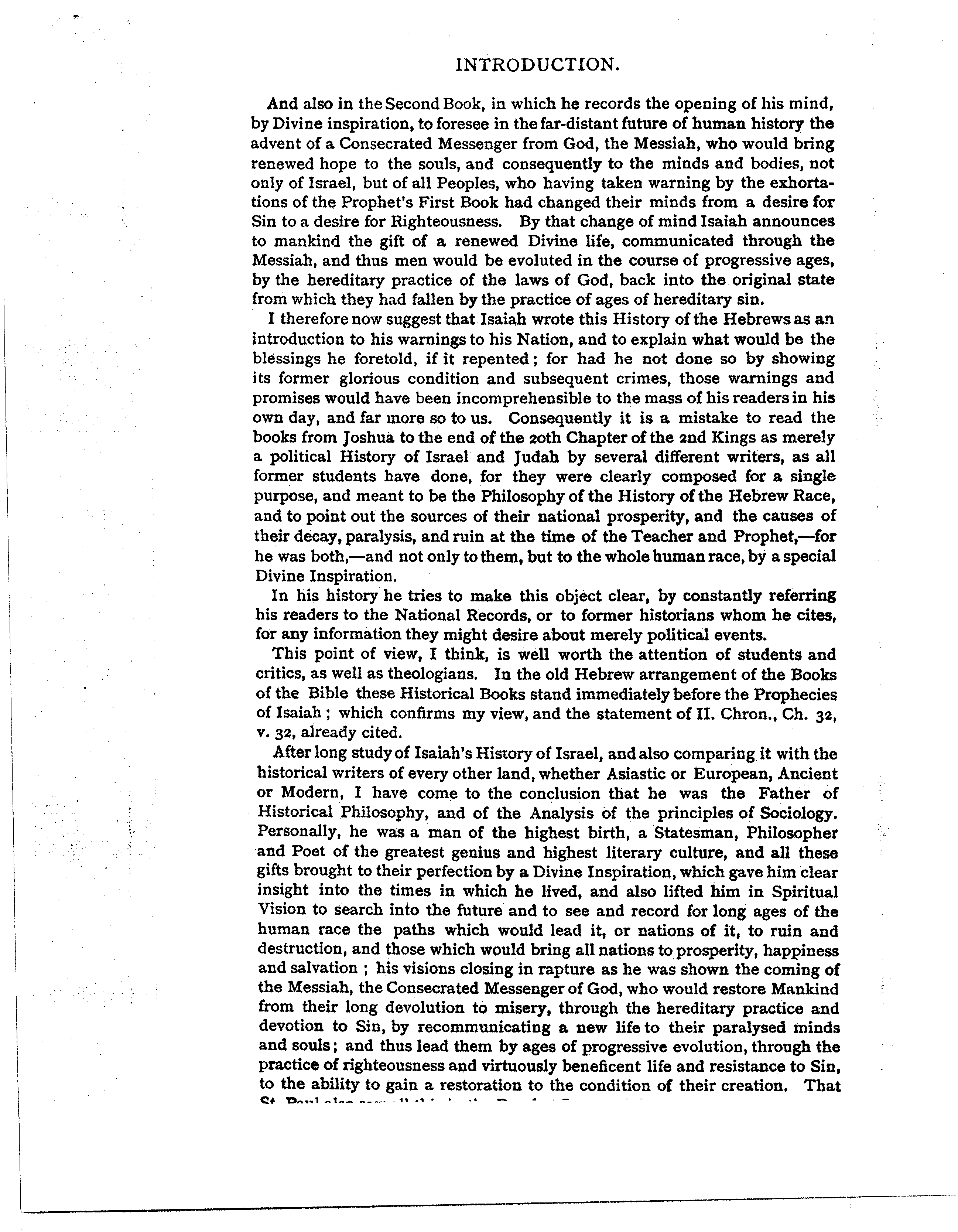Deuteronomy (The Speeches of Moses) - Ferrar Fenton Bible Translation page 218
The Five Books of Moses
by Divine inspiration, to foresee in the far-distant future of human history the advent of a Consecrated Messenger from God, the Messiah, who would bring renewed hope to the souls, and consequently to the minds and bodies, not only of Israel, but of all Peoples, who having taken warning by the exhorta- tions of the Prophet’s First Book had changed their minds from a desire for Sin to a desire for Righteousness. By that change of mind Isaiah announces to mankind the gift of a renewed Divine life, communicated through the Messiah, and thus men would be evoluted in the course of progressive ages, by the hereditary practice of the laws of God, back into theoriginal state from which they had fallen by the practice of ages of hereditary sin. I therefore now suggest that Isaiah wrote this History of the Hebrews as an
introduction to his warnings to his Nation, and to explain what would be the blessings he foretold, if it repented; for had he not done so by showing its former glorious condition and subsequent crimes, those warnings and promises would have been incomprehensible to the mass of his readers in his own day, and far more so to us. Consequently it is a mistake to read the books from Joshua to the end of the zoth Chapter of the and Kings as merely a political History of Israel and judah by several different writers, as all former students have done, for they were clearly composed for a single purpose, and meant to be the Philosophy of the History of the Hebrew Race, and to point out the sources of their national prosperity, and the causes of their decay, paralysis, and ruin at the time of the Teacher and Prophet,-for he was both,——and not only to them, but to the whole human race, by a special Divine Inspiration. In his history he tries to make this object clear, by constantly referring
his readers to the National Records, or to former historians whom he cites, for any information they might desire about merely political events. This point of view, I think, is well worth the attention of students and
critics, as well as theologians. In the old Hebrew arrangement of the Books of the Bible these Historical Books stand immediately before the Prophecies of Isaiah; which confirms my view, and the statement of II. Chron., Ch. 32, v. 32, already cited. After long study of Isaiah’s History of Israel, and also comparing it with the
historical writers of every other land, whether Asiastic or European, Ancient or Modern, I have come to the conclusion that he was the Father of Historical Philosophy, and of the Analysis of the principles of Sociology. Personally, he was a man of the highest birth, a Statesman, Philosopher and Poet of the greatest genius and highest literary culture, and all these gifts brought to their perfection by a Divine Inspiration, which gave him clear insight into the times in which he lived, and also lifted him in Spiritual Vision to search into the future and to see and record for long ages of the human race the paths which would lead it, or nations of it, to ruin and destruction, and those which would bring all nations to_ prosperity, happiness and salvation ; his visions closing in rapture as he was shown the coming of the Messiah, the Consecrated Messenger of God, who would restore Mankind from their long devolution to misery, through the hereditary practice and devotion to Sin, by recommuuicating a new life to their paralysed minds and souls; and thus lead them by ages of progressive evolution, through the practice of righteousness and virtuously beneticent life and resistance to Sin, to the ability to gain a restoration to the condition of their creation. That Q4 *¤..·1 ..1.... ---». -¤· ·~ · · -
